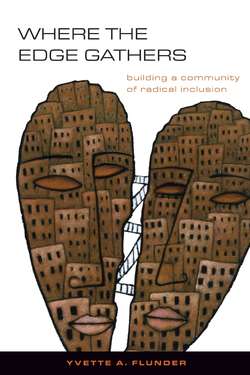Читать книгу Where the Edge Gathers: - Yvette A. Flunder - Страница 11
На сайте Литреса книга снята с продажи.
INTIMACY WITH GOD
ОглавлениеCreating community with and among marginalized people who have been alienated from the Christian community must include encouragement to seek an intimate relationship with God. An assurance of relationship with God provides the security to interpret critically the scriptures and traditions that have alienated so many for so long. People on the edge must be encouraged to form a concept of a loving God who desires to have intimate relationship with his/her creation. This must precede a historical/critical analysis of Scripture. Having a secure location in God makes it permissible to question those passages of Scripture that have traditionally brought terror. A woman minister, a SGL person, or the progeny of slaves cannot be a biblical literalist. It would be entirely too difficult to explain away all of the texts that do not support her personhood and her call. Where, then, is the place of the Bible in the life of the marginalized church? My position is best explained by a response from an unnamed slave who, when she was told that the Bible said she was to be a slave, answered, “Not my Bible; I tore dat page out!”
True spiritual liberation is the Spirit of God working in our spirits, revealing God to us. There is a danger in making the Bible God, instead of seeing the Bible as writings that point to God. According to Gomes, when we seek to interpret the Bible we should be careful of these things:
Bibliolatry or the worship of the Bible, making of it an object of veneration and ascribing to it the glory due to God. Literalism or the worship of the text in which the letter is given, is an inappropriate superiority over the spirit, and culturism or the worship of the culture, in which the Bible is forced to conform to the norms of the prevailing culture.18
As to the issue of culturism, in this country we often hear “God is the God of our America. We are the people God loves most. Let’s get America back to God.” It is as though we have an exclusive right to God. In our nation, what is called Christianity is often Americanism. “God must prefer my country because I do.” With this thinking, we can close the borders to aliens, oppress minorities, justify foreign wars, continue manifest destiny, or whatever because “God is our God and prefers us.” In his discourse about “nation worship,” Kater asks the question, “Is it really appropriate to consider ourselves the Chosen People and the successor among the nations, of God’s Promised Land? Is it not more a sign of that pride that the Bible considers a temptation?”19
Certain political parties and special interest groups think God belongs to them. You can hear language about God coupled with everything from the political agenda of the religious right to the gun lobby. Similarly, African Americans and other minorities sometimes feel God loves us much more than anyone else and that we are sanctified by our history of suffering.
Making God the sole property of certain nations and cultures leads us to making God the sole property of denominations, each one claiming sole proprietorship of the truth. Within the Christian church, we teach baptism in Jesus’ name, in the names of the trinity as well as for adults only, for children only, by immersion, by sprinkling, as necessary for salvation, and as a prerequisite for the gift of the Holy Spirit. Who is right?
Turf wars abound for ownership of the “real word” of God. The division this causes is amazing. God is not exclusively the God of any nation, or any denomination. Nations are formed to facilitate the needs of their citizens. Christian denominations are set up to facilitate the work of the church on earth. People—individuals, not buildings or institutions—are called to be a habitation for the Spirit of God. It is intimacy with God that emboldens people in their quest to extricate life-giving principles from the Bible.
I would like to argue for one other reason to encourage people to seek intimacy with God as a prerequisite to a critical study of Scripture. I call it preconceived interpretation.
